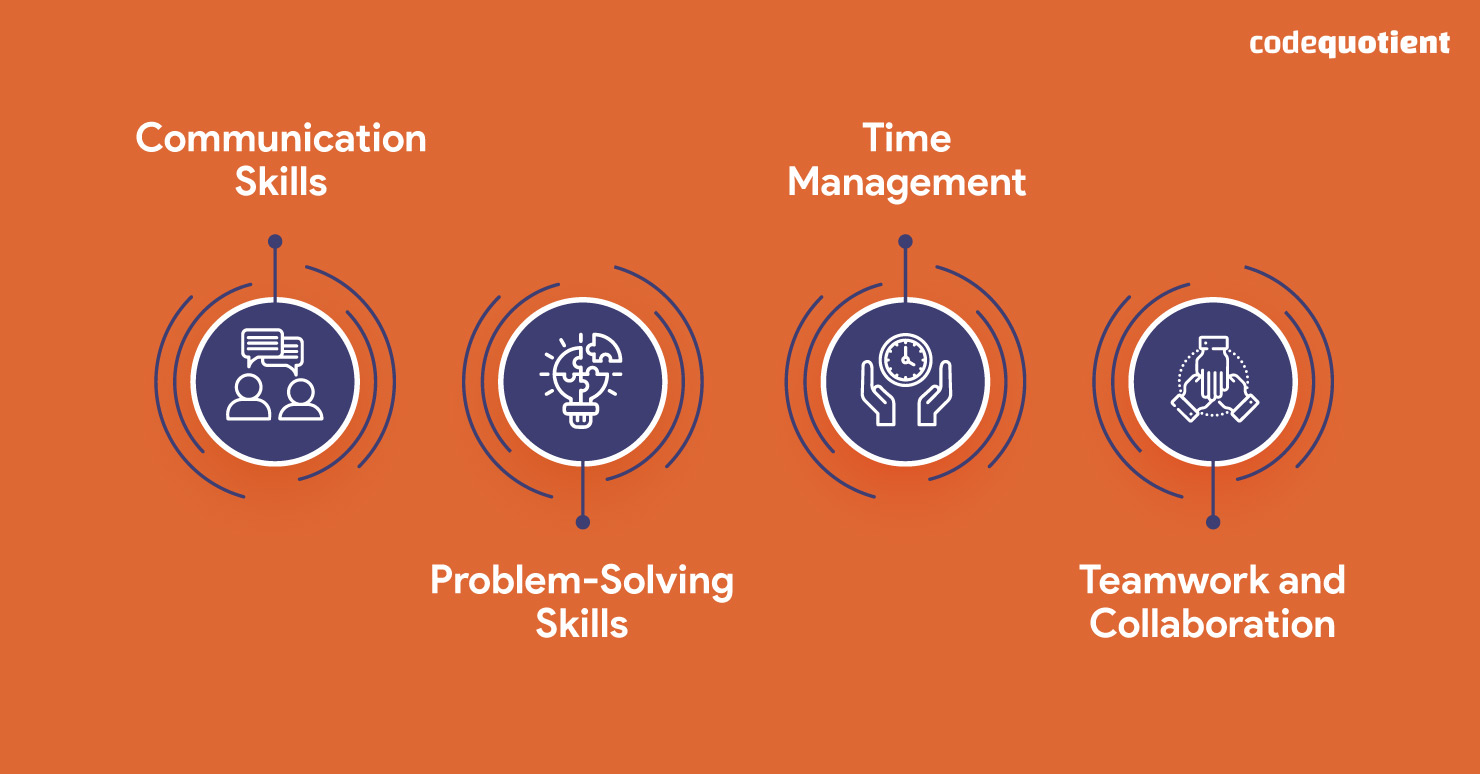Software engineering is a rapidly growing field, with technology advancing at an unprecedented pace. The technical skills required to become a software engineer are ever-changing and demanding, but the importance of soft skills is often overlooked.
Soft skills combine interpersonal, communication, and problem-solving abilities essential for success in any career, including software engineering.
CodeQuotient’s software engineering program (CQ-SEP) understands the significance of soft skills in the workplace and has developed a holistic approach to education.
In this article, we will explore the role of soft skills in software engineering careers and how CQ-SEP’s focus on holistic education can provide students with a competitive edge in the job market.
Importance of Soft Skills in Software Engineering Careers

Soft skills refer to personal attributes that enable individuals to interact effectively and harmoniously with others. They are skills not specific to a particular job or industry but essential for success in any field.
Software engineering is a collaborative field that requires teamwork, communication, and problem-solving skills. Engineers generally work with cross-functional teams, including designers, project managers, and stakeholders. Therefore, software engineering projects may encounter delays, misunderstandings, and conflicts without soft skills.
Here are some soft skills you need in Software Engineering:
1. Communication Skills
Clear and effective communication is crucial in software engineering. Engineers must be able to explain complex technical concepts to non-technical stakeholders. Effective communication can reduce misunderstandings, improve collaboration, and increase project success.
2. Problem-Solving skills
Software engineers encounter problems every day. Problem-solving skills are essential for identifying and resolving issues. The ability to analyse a situation, identify the root cause of the problem, and develop a solution is critical in software engineering.
3. Time Management
Software engineering projects often have tight deadlines. Time management skills are essential for ensuring that projects are completed on time. Engineers must prioritise tasks, manage their time effectively, and meet deadlines.
4. Teamwork and Collaboration
Software engineering projects involve cross-functional teams. Engineers must work together effectively, communicate clearly, and collaborate to achieve project goals. The ability to work in a team is essential for success in software engineering careers.
Why Holistic Education is Crucial for Software Engineers
Let’s take a closer look at why software engineers need holistic education to excel in their careers.
Relying solely on technical skills is not enough
Technical skills are necessary for software engineering but insufficient for workplace success. Employers are looking for engineers who possess both technical and soft skills. Engineers with excellent technical skills but poor soft skills may encounter difficulty in their careers.
Soft skills help you navigate better in the workplace
Soft skills are becoming increasingly important in the workplace. Employers seek individuals who can communicate effectively, collaborate with others, and solve problems. Thus, soft skills can help individuals advance in their careers and become successful leaders.
CQ-SEP’s Modern Approach to Holistic Education
CQ-SEP recognises the importance of soft skills in software engineering careers and has developed a comprehensive approach to providing students with a holistic education.
The program provides students with a well-rounded education with technical and soft skills.
Here is how CQ-SEP focuses on developing soft skills in its students:
1. Soft Skills Training in the Curriculum
CQ-SEP integrates soft skills training into its curriculum, ensuring students develop the necessary skills and technical skills. This includes courses on communication, teamwork, problem-solving, and time management.
2. Industry-Relevant Education and Internships
CQ-SEP provides students with industry-relevant education and internships that expose them to real-world software engineering environments. This helps students to develop their soft skills in a practical setting and prepares them for the demands of the industry.
3. Mentorship and Career Guidance
CQ-SEP provides students with mentorship and career guidance, helping them identify their strengths and weaknesses and providing guidance on developing their soft skills. This helps students to identify and work towards their career goals and develop the necessary skills to succeed.
Uncovering the Benefits of Soft Skills in CQ-SEP’s Holistic Education
CQ-SEP’s approach to holistic education provides students with a range of benefits, including:
1. Increased Employability
Graduates of CQ-SEP are highly employable, as they have the necessary technical and soft skills employers require. This makes them stand out in a competitive job market and increases their chances of securing their dream job.
2. Career Advancement Opportunities
The soft skills developed through CQ-SEP’s holistic education approach prepare students for leadership roles in the software engineering industry. It opens up opportunities for career advancement and growth.
3. Personal Development and Growth
CQ-SEP’s approach to holistic education prepares students for successful careers in software engineering. Students develop self-awareness, emotional intelligence, and other valuable life skills that can be applied in all areas of their lives.
Equipping Future Software Engineers with Technical and Soft Skills: The CQ-SEP Approach
If you are a student interested in pursuing a career in software engineering, CQ-SEP is the right option.
CQ-SEP integrates soft skills training, industry-relevant education, and the opportunity to earn while you learn into its 3-year program with 1.5 years of work experience.
Get a UGC-Recognised Degree from a NAAC A+ accredited partner university and assured placement in top IT companies.
Enrol now and start your journey towards a successful career in software engineering!




